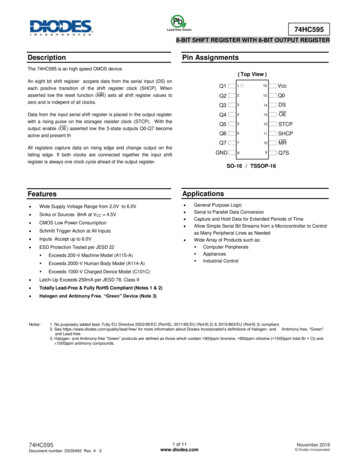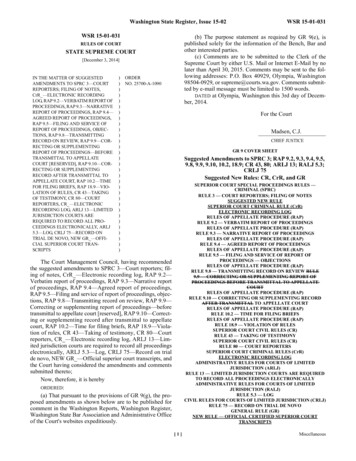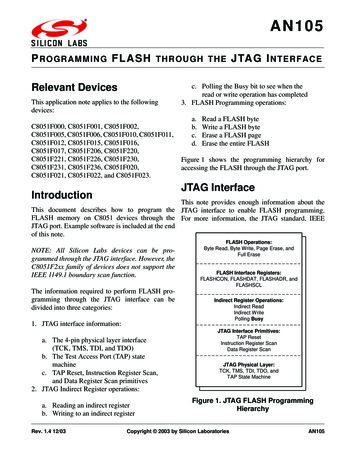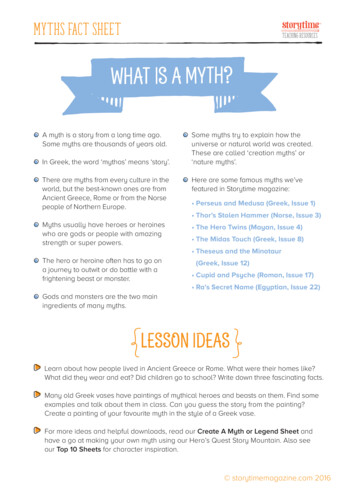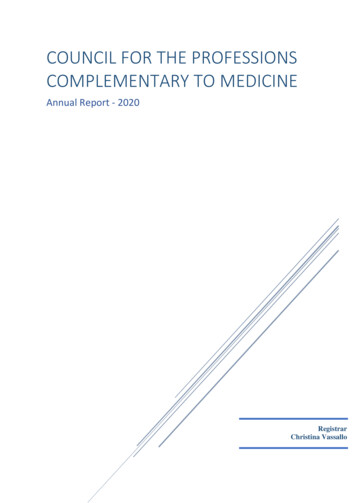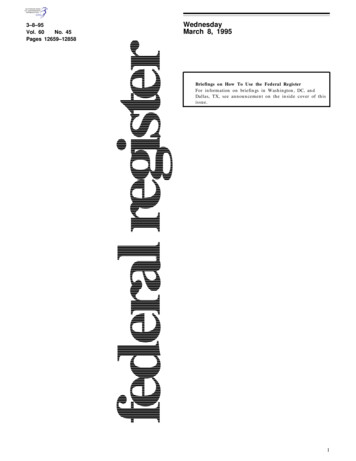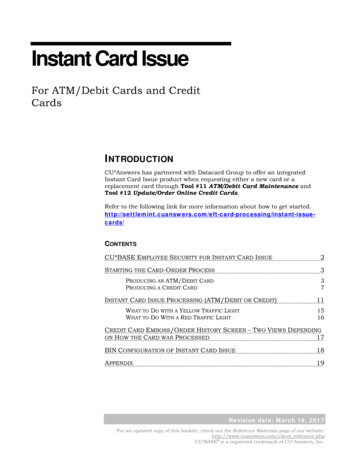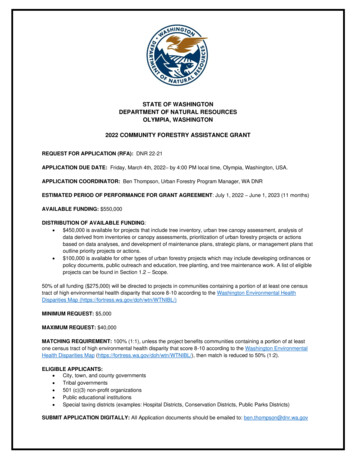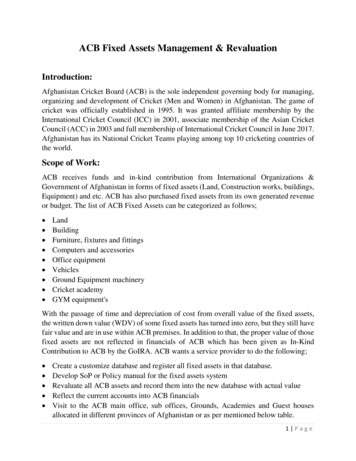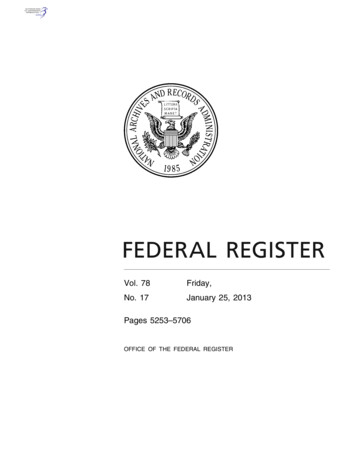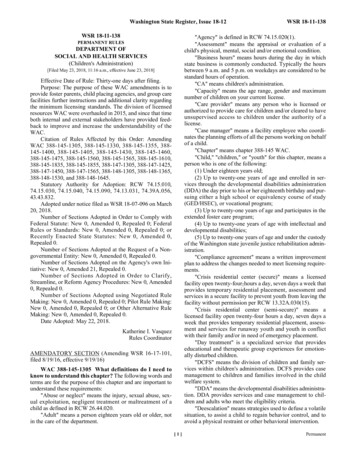
Transcription
Washington State Register, Issue 18-12WSR 18-11-138WSR 18-11-138"Agency" is defined in RCW 74.15.020(1)."Assessment" means the appraisal or evaluation of achild's physical, mental, social and/or emotional condition."Business hours" means hours during the day in whichstate business is commonly conducted. Typically the hoursbetween 9 a.m. and 5 p.m. on weekdays are considered to bestandard hours of operation."CA" means children's administration."Capacity" means the age range, gender and maximumnumber of children on your current license."Care provider" means any person who is licensed orauthorized to provide care for children and/or cleared to haveunsupervised access to children under the authority of alicense."Case manager" means a facility employee who coordinates the planning efforts of all the persons working on behalfof a child."Chapter" means chapter 388-145 WAC."Child," "children," or "youth" for this chapter, means aperson who is one of the following:(1) Under eighteen years old;(2) Up to twenty-one years of age and enrolled in services through the developmental disabilities administration(DDA) the day prior to his or her eighteenth birthday and pursuing either a high school or equivalency course of study(GED/HSEC), or vocational program;(3) Up to twenty-one years of age and participates in theextended foster care program;(4) Up to twenty-one years of age with intellectual anddevelopmental disabilities;(5) Up to twenty-one years of age and under the custodyof the Washington state juvenile justice rehabilitation administration."Compliance agreement" means a written improvementplan to address the changes needed to meet licensing requirements."Crisis residential center (secure)" means a licensedfacility open twenty-four-hours a day, seven days a week thatprovides temporary residential placement, assessment andservices in a secure facility to prevent youth from leaving thefacility without permission per RCW 13.32A.030(15)."Crisis residential center (semi-secure)" means alicensed facility open twenty-four hours a day, seven days aweek that provides temporary residential placement, assessment and services for runaway youth and youth in conflictwith their family and/or in need of emergency placement."Day treatment" is a specialized service that provideseducational and therapeutic group experiences for emotionally disturbed children."DCFS" means the division of children and family services within children's administration. DCFS provides casemanagement to children and families involved in the childwelfare system."DDA" means the developmental disabilities administration. DDA provides services and case management to children and adults who meet the eligibility criteria."Deescalation" means strategies used to defuse a volatilesituation, to assist a child to regain behavior control, and toavoid a physical restraint or other behavioral intervention.PERMANENT RULESDEPARTMENT OFSOCIAL AND HEALTH SERVICES(Children's Administration)[Filed May 23, 2018, 11:16 a.m., effective June 23, 2018]Effective Date of Rule: Thirty-one days after filing.Purpose: The purpose of these WAC amendments is toprovide foster parents, child placing agencies, and group carefacilities further instructions and additional clarity regardingthe minimum licensing standards. The division of licensedresources WAC were overhauled in 2015, and since that timeboth internal and external stakeholders have provided feedback to improve and increase the understandability of theWAC.Citation of Rules Affected by this Order: AmendingWAC 388-145-1305, 388-145-1330, 388-145-1355, 388145-1400, 388-145-1405, 388-145-1430, 388-145-1460,388-145-1475, 388-145-1560, 388-145-1565, 388-145-1610,388-145-1835, 388-145-1855, 388-147-1305, 388-147-1425,388-147-1450, 388-147-1565, 388-148-1305, 388-148-1365,388-148-1530, and 388-148-1645.Statutory Authority for Adoption: RCW 74.15.010,74.15.030, 74.15.040, 74.15.090, 74.13.031, 74.39A.056,43.43.832.Adopted under notice filed as WSR 18-07-096 on March20, 2018.Number of Sections Adopted in Order to Comply withFederal Statute: New 0, Amended 0, Repealed 0; FederalRules or Standards: New 0, Amended 0, Repealed 0; orRecently Enacted State Statutes: New 0, Amended 0,Repealed 0.Number of Sections Adopted at the Request of a Nongovernmental Entity: New 0, Amended 0, Repealed 0.Number of Sections Adopted on the Agency's own Initiative: New 0, Amended 21, Repealed 0.Number of Sections Adopted in Order to Clarify,Streamline, or Reform Agency Procedures: New 0, Amended0, Repealed 0.Number of Sections Adopted using Negotiated RuleMaking: New 0, Amended 0, Repealed 0; Pilot Rule Making:New 0, Amended 0, Repealed 0; or Other Alternative RuleMaking: New 0, Amended 0, Repealed 0.Date Adopted: May 22, 2018.Katherine I. VasquezRules CoordinatorAMENDATORY SECTION (Amending WSR 16-17-101,filed 8/19/16, effective 9/19/16)WAC 388-145-1305 What definitions do I need toknow to understand this chapter? The following words andterms are for the purpose of this chapter and are important tounderstand these requirements:"Abuse or neglect" means the injury, sexual abuse, sexual exploitation, negligent treatment or maltreatment of achild as defined in RCW 26.44.020."Adult" means a person eighteen years old or older, notin the care of the department.[1]Permanent
WSR 18-11-138Washington State Register, Issue 18-12"Department or DSHS" means the department of socialand health services."Developmental disability" is a disability as defined inRCW 71A.10.020."Direct care staff" means persons who provide dailysupervision and direct care to group care children and youth."DLR" means the division of licensed resources withinchildren's administration. DLR licenses and monitors fosterhomes, child placing agencies and licensed group care facilities."DOH" means the department of health."Electronic monitoring" means video or audio monitoring or recording used to watch or listen to children as a wayto monitor their behavior."Emergency respite center (ERC)" means a licensedfacility that may be commonly known as a crisis nursery,which provides emergency or crisis care for nondependentchildren birth through seventeen years for up to seventy-twohours to prevent child abuse and/or neglect per RCW 74.15.020(d). ERCs may choose to be open up to twenty-four hoursa day, seven days a week. Facilities may also provide familyassessment, family support services and referral to community services."FBI" means the Federal Bureau of Investigation."Group care" is a general term for a licensed facility thatis maintained and operated for a group of children on atwenty-four-hour basis to provide a safe and healthy livingenvironment that meets the developmental needs of the children in care per RCW 74.15.020 (1)(f)."Group home" is a specific license for residential carethat provides care and supervision for children or youth."Group receiving center" means a licensed facility thatprovides the basic needs of food, shelter, and supervision forchildren placed by the department, generally for thirty orfewer days."Guns or weapons" means any device intended to shootprojectiles under pressure or that can be used to attack. Theseinclude but are not limited to BB guns, pellet guns, air rifles,stun guns, antique guns, handguns, rifles, shotguns andarchery equipment."Health care staff" means anyone providing qualifiedmedical consultation to your staff or medical care to the children and youth in your care."Hearing" means the administrative review process conducted by an administrative law judge."I, my, you, and your" refers to an applicant for a licenseissued under this chapter, and to any party holding a licenseunder this chapter."Infant" means a child less than twelve months of age."Intellectual and developmental disability" means children with deficits in general mental abilities and impairmentin everyday adaptive functioning."Interim facility" means an overnight youth shelter,emergency respite center or a resource and assessment center."License" means a permit issued by us that your facilitymeets the licensing standards established in this chapter."Licensed health care provider" means an MD (medicaldoctor), DO (doctor of osteopathy), ND (doctor of naturopathy), PA (physician's assistant), or an ARNP (advanced registered nurse practitioner).Permanent"Local fire authority" means your local fire inspectionauthority having jurisdiction in the area where your facility islocated."Maternity service" as defined in RCW 74.15.020. Theseare also referred to as pregnant and parenting youth programs."Medically fragile" means the condition of a child whorequires the availability of twenty-four-hour skilled care froma health care professional or specially trained staff or volunteers in a group care setting. These conditions may be presentall the time or frequently occurring. If the technology, support and services being received by the medically fragile children are interrupted or denied, the child may, without immediate health care intervention, experience death."Missing child" means any child less than eighteen yearsof age in licensed care or under the care, custody, and authority of CA and the child's whereabouts are unknown and/or thechild has left care without the permission of the child's caregiver or ((assigned DSHS worker)) CA. This does not includechildren in dependency guardianship."Multidisciplinary teams (MDT)" means groups formedto assist children who are considered at risk youth or childrenin need of services, and their parents."Negative action" means a court order, court judgment,or adverse action taken by an agency, in any state, federal,local, tribal, or foreign jurisdiction, that results in a findingagainst the applicant reasonably related to the individual'ssuitability, and competence to care for or have unsupervisedaccess to children in out-of-home care. This may include, butis not limited to:(1) A decision issued by an administrative law judge;(2) A final determination, decision, or finding made byan agency following an investigation;(3) An adverse licensing action, including termination,revocation, or denial of a license or certification, or if there isa pending adverse action, the voluntary surrender of a license,certification, or contract in lieu of an adverse action;(4) A revocation, denial, or restriction placed on any professional license; or(5) A final decision of a disciplinary board."Nonambulatory" means not able to walk or exit tosafety without the physical assistance of another individual."Out-of-home placement" means a child's placement in ahome or facility other than the child's parent, guardian, orlegal custodian."Overnight youth shelter" means a licensed nonprofitagency that provides overnight shelter to homeless or runaway youth in need of emergency sleeping arrangements."Probationary license" means a license issued as part ofa corrective action to an individual or agency that has previously been issued a full license but is out of compliance withminimum licensing requirements and has entered into anagreement aimed at correcting deficiencies."Property or premises" means a facility's buildings andadjoining grounds that are managed by a person or agency incharge."Psychotropic medication" means a type of medicinethat is prescribed to affect or alter thought processes, mood,sleep, or behavior. These include antipsychotic, antidepressant and antianxiety medications.[2]
Washington State Register, Issue 18-12WSR 18-11-138or agency, by an evaluator we recommend. Any evaluationrequested by the department will be at your expense. Theevaluator must be given written permission to share information with us prior to and throughout the evaluation process.(((6))) (7) Any employee, intern, or volunteer who isfound to have misrepresented or provided fraudulent information may be disqualified.(((7))) (8) Before granting or renewing a license, yourlicensor will assess your ability to provide a safe environmentfor children and to provide the quality of care needed by children placed in your care. Your licensor will also determinethat you meet training requirements."Relative" means a person who is related to a child perRCW 74.15.020."Resource and assessment center" means an agency thatprovides short-term emergency and crisis care for a period upto seventy-two hours, (excluding Saturdays, Sundays, andholidays) to children who have been removed from their parent's or guardian's care by child protective services or lawenforcement."Staffed residential home" means a licensed facility thatprovides twenty-four-hour care to six or fewer children whorequire more supervision than can be provided in a fosterhome."Treatment plan" means individual plans that identifythe service needs of the child, including the child's parent orguardian, and identifies the treatment goals and strategies forachieving those goals."Washington state patrol fire protection bureau" or"WSP/FPB" means the state fire marshal."Volunteer" means a person who provides direct careservices without compensation, for your facility."We, our, and us" refers to the department of social andhealth services, including DLR and DCFS staff."Young child" refers to a child age twelve monthsthrough eight years old.AMENDATORY SECTION (Amending WSR 15-01-069,filed 12/11/14, effective 1/11/15)WAC 388-145-1355 Am I required to comply withlocal ordinances? You are responsible for obtaining a certificate of occupancy and for following all local and state regulations such as zoning regulations, community covenants,local building codes and fire codes. The department mayrequire you to provide proof that you are complying withlocal regulations.AMENDATORY SECTION (Amending WSR 15-01-069,filed 12/11/14, effective 1/11/15)AMENDATORY SECTION (Amending WSR 16-06-041,filed 2/24/16, effective 3/26/16)WAC 388-145-1330 How does the department determine my suitability to become a licensed provider or anemployee, intern, or volunteer of a licensed provider? (1)The department determines your suitability as a licensed provider after receiving your application, background authorization(s) for those listed in WAC 388-145-1325(2), and allrequired documentation outlined in this chapter.(2) The department determines the suitability of alicensee, employee, intern, or volunteer after receiving theirbackground authorization referenced in subsection (1) above.(3) You, your employees, interns, and volunteers mustnot have had a license or contract denied or revoked from anagency that regulates the care of children or vulnerableadults, unless the department determines that you do not posea risk to a child's safety, well-being and long-term stability.(((3))) (4) You, your employees, interns, and volunteersmust not have been found to have committed abuse or neglectof a child or vulnerable adult, unless the department determines that you do not pose a risk to a child's safety, wellbeing, and long-term stability.(((4))) (5) You must demonstrate that you, your employees, interns, and volunteers have:(a) The understanding, ability, physical health, emotional stability and personality suited to meet the physical,mental, emotional, cultural, and social needs of the childrenunder your care; and(b) The ability to furnish children with a nurturing,respectful, and supportive environment.(((5))) (6) At any time, we may require you ((or)), youremployees, interns, and volunteers to give us additionalinformation. We may also require an evaluation of your facility or property, or of a staff person working for your facilityWAC 388-145-1400 ((Can)) Must prospective andcurrent employees, volunteers, interns, and subcontractors be disqualified from having access to the children inmy facility? (1) The department must disqualify prospectiveand current employees, volunteers ((or)), interns, and subcontractors if they do not meet the regulations of chapter 388145 WAC, or cannot have unsupervised access to childrenbecause of their background check as outlined in chapter 38806A WAC.(2) ((We)) The department must disqualify prospectiveand current employees, interns, volunteers, and subcontractors if they have had a negative action taken on a license orcontract, or have had a license denied or revoked by anagency that regulates the care of children or vulnerableadults, unless the department determines that the individualdoes not pose a risk to a child's safety, well-being, and longterm stability.(3) Applicant's, employees, interns, volunteers, and subcontractors must demonstrate that they have the understanding, ability, physical health, emotional stability, and personality suited to meet the physical, mental, emotional, cultural,and social needs of the children under their care.(4) The department will notify ((you)) the licensee if a((person in your facility)) prospective or current employee,intern, volunteer, or subcontractor is disqualified from havingunsupervised access to children. ((This)) Hiring a person disqualified by DSHS or continuing to allow unsupervisedaccess to children by a person disqualified by DSHS couldalso lead to denial, suspension, or revocation of your licenseissued under this chapter.[3]Permanent
WSR 18-11-138Washington State Register, Issue 18-12AMENDATORY SECTION (Amending WSR 15-01-069,filed 12/11/14, effective 1/11/15)(5) A case management staff or person with equivalenttraining and experience of an on-site program manager maysatisfy this requirement.(6) For overnight youth shelters, the required prior experience must be in working with adolescents.WAC 388-145-1405 What ((can)) may I do if I disagree with your decision to modify, deny, suspend orrevoke my license, or to disqualify my backgroundcheck? (((1))) You have the right to request an administrativehearing if you disagree with any of these actions. You mustrequest this hearing within twenty-eight calendar days ofreceiving a certified letter with our decision (see chapter34.05 RCW). To request a hearing you must send a letter tothe Office of Administrative Hearings, P.O. Box 42489,Olympia, Washington ((98504-2456)) 98504-2489, 1-800583-8271. The letter must have the following:(((a))) (1) A specific statement indicating why you disagree with our decision and any laws you believe are relatedto your claim; and(((b))) (2) A copy of the certified letter we sent to modify, revoke, suspend, or deny your license or to disqualifyyour background check.AMENDATORY SECTION (Amending WSR 15-01-069,filed 12/11/14, effective 1/11/15)WAC 388-145-1460 Do I need to employ consultantsat my facility? (1) You must have case management consultants available as needed to work with your staff, the childrenyou serve, and the children's families. Other consultants maybe used for program support.(2) A case management consultant is responsible ((to))for:(a) ((Review)) Reviewing treatment((,)) or case plans((,or adoption home studies)) as appropriate;(b) ((Provide)) Providing one hour of consultation/supervision to case management staff for every twenty hours a person works. Staff consultations shall be documented and available to staff on an as-needed basis; and(c) ((Monitor)) Monitoring staff's skill development inorder to effectively manage their cases.(3) Each case management consultant must have:(a) A master's degree in social services or a closelyrelated field from an accredited school;(b) The training, experience, knowledge, and demonstrated skills for each area in which ((s/he)) he or she will besupervising or advising;(c) The ability to ensure staff develop their skills, areadequately trained, and have the understanding needed toeffectively manage cases; and(d) Knowledge of mandatory child abuse and neglectreporting requirements.(4) Consultants may be hired as staff or operate under acontract and must meet the full professional competencyrequirements and academic training in their respective fields.(5) If you have consultants working in emergency respitecenters, they must also have training and experience in earlychildhood education.AMENDATORY SECTION (Amending WSR 15-01-069,filed 12/11/14, effective 1/11/15)WAC 388-145-1430 What are the requirements of anon-site program manager? (1) On days your facility isoperational, you must have an on-site program manager atyour facility during business hours when youth are present.Staffed residential facilities licensed for five or fewer arerequired to have an on-site program manager during businesshours when youth are present if the focus of the program isbehavioral and a child's behavior poses a risk. The on-siteprogram manager must meet the qualifications to:(a) Coordinate the day-to-day operations of the program;(b) Supervise the case management and direct care staff;and(c) Have the responsibility to ensure the completion ofeach child's plan of care and treatment.(2) When youth are not present and the program manageris not on-site, ((s/he)) he or she must be available by telephone.(3) An on-site program manager must have one or moreof the following:(a) A master's degree in social services or a closelyrelated field from an accredited school and one year of experience working with children or youth; ((or))(b) A bachelor's degree in social services or a closelyrelated field from an accredited school and two years of experience working with children or youth; ((or))(c) Five years of successful full-time experience in a relevant field working with children or youth; and(i) Supervisory abilities that promote effective staff performance; and(ii) Relevant experience, training and demonstratedskills in each area that ((s/he)) he or she will be managing orsupervising.(4) An on-site program manager must not provide clinical oversight to case management staff unless they meet thesupervision requirements in WAC 388-145-1440(3).PermanentAMENDATORY SECTION (Amending WSR 15-01-069,filed 12/11/14, effective 1/11/15)WAC 388-145-1475 What are the requirements forvolunteers working directly with children((/)) and youthat my facility? (1) These volunteers must meet the licensingrequirements listed in this chapter, including meeting thequalifications for direct care staff and must:(a) Be at least twenty-one years of age unless they arebetween eighteen and twenty-one years of age in an internship or practicum program as per WAC 388-145-1445; and(b) ((Be supervised at all times by at least one paid staffmember or designated volunteer meeting the qualifications ofa program manager, working on-site. (Volunteers meetingprogram manager qualifications may provide direct careunsupervised.); and(c))) Receive the facility's preservice training thataddresses the needs of the population of children in care.[4]
Washington State Register, Issue 18-12WSR 18-11-138AMENDATORY SECTION (Amending WSR 15-01-069,filed 12/11/14, effective 1/11/15)AMENDATORY SECTION (Amending WSR 16-17-101,filed 8/19/16, effective 9/19/16)WAC 388-145-1560 What toilet and bathing facilitiesare required? (1) You must meet the following requirementsfor toilets, sinks, and bathing facilities:(a) Provide toilets, urinals, and hand-washing sinksappropriate to the height for the children served, or have asafe and easily cleaned step stool or platform that is waterresistant;(b) Provide soap and clean towels, disposable towels orother approved hand-drying devices to the children in yourcare;(c) Provide adequate grab-bars((,)) or nonskid pads convenient for children;(d) Provide appropriate toilet training equipment forchildren. You must regularly maintain this equipment andkeep it in sanitary condition. You must place toilet trainingequipment on washable, water-resistant surfaces and disinfect toilet training equipment after each child's use.(2) If you care for children under the age of six, or children with intellectual and developmental disabilities, youmust monitor the use of bathtub, shower, or other bathingfacilities while in use.(3) If you operate a group care facility for six or morechildren you must have a housekeeping sink or department ofhealth approved method of drawing clean mop water and disposing of the wastewater.WAC 388-145-1610 What are the requirements forbeds in a facility? (1) You must provide an appropriatelysized separate bed for each child, with clean bedding and amattress in good condition.(2) Some children may soil the bed, and you may need toplan accordingly. You must provide waterproof mattress covers or moisture-resistant mattresses if needed. Each child'spillow must be covered with waterproof material or be washable.(3) A mat may be used for napping but not as a substitutefor a bed.(4) You must provide an infant with a crib that ensuresthe safety of the infant, and complies with chapter 70.111RCW, Consumer Product Safety Improvement Act of 2008.These regulations include:(a) A maximum of 2 3/8" between vertical slats of thecrib; and(b) Cribs, infant beds, bassinets, and playpens must((have)) be made of wood, metal, or approved plastic, withsecure latching devices and clean, firm, snug fitting mattresses covered with waterproof material that can ((be)) easily be disinfected ((and be made of wood, metal, or approvedplastic with secure latching devices)).(5) You must place infants on their backs for sleeping,unless advised differently by the child's licensed health careprovider.(6) You ((may)) must not have loose blankets, pillows,crib bumpers, or stuffed toys with a sleeping infant.(7) You may swaddle infants using one lightweight blanket upon the advice and training of a licensed health care provider. You must keep the blanket loose around the hips andlegs when swaddling in order to avoid hip dysplasia. Youmay swaddle infants under two months of age unless alicensed health care provider directs otherwise. You ((may))must not dress a swaddled infant in a manner that allowsthem to overheat.(8) You ((may)) must not use wedges and positionerswith a sleeping infant unless advised differently by theinfant's licensed health care provider.(9) You ((may)) must not use weighted blankets for children under three years of age or ((that have)) for children ofany age with mobility limitations ((unless advised differentlyby the child's licensed health care provider)).(10) ((If)) You may use a weighted blanket((,)) upon theadvice and training from a licensed health care provider forchildren over the age of three years who do not have mobilitylimitations. You must meet the following requirements:(a) The weight of the blanket ((may)) must not exceedten percent of the child's body weight;(b) Metal beads are choking hazards and ((may)) mustnot be used in a weighted blanket; ((and))(c) You ((may)) must not cover the child's head with aweighted blanket or place it above the middle of the child'schest((.)):(d) The weighted blanket must not hinder a child's movement; and(e) The weighted blanket must not be used as a restraint.AMENDATORY SECTION (Amending WSR 15-01-069,filed 12/11/14, effective 1/11/15)WAC 388-145-1565 What is the ratio of persons normally on the premises to bathrooms at my facility? (1)You must maintain the following ratio of toilets, handwashing sinks, and bathing hot and cold running water)BATHINGFACILITIES(hot and coldrunning water)Group residential programslicensed for 5or fewer1 minimum1 minimum1 minimumGroup residential for 6 ormore2 minimum1:8 ratio2 minimum1:8 ratio1 minimum1:8 ratio(2) In programs providing care to expectant mothers, allsleeping areas must have at least one toilet and handwashingsink on the same floor.(3) Children eighteen months of age or younger andother children who do not use a toilet need not be includedwhen determining the number of required flush-type toilets.(((4) All sleeping areas must have at least one toilet andhandwashing sink on the same floor.))[5]Permanent
WSR 18-11-138Washington State Register, Issue 18-12social worker to determine what consent is needed. Thesocial worker may need to obtain consent from the child agethirteen or older, the parent, or the court.(5) You must follow the direction of the agency or courtregarding giving or applying prescription and nonprescription medications if you care for children in the custody ofanother agency, or tribal or other court. If this is in conflictwith children's administration policy, you must notify thechild's DCFS worker.(6) You must not give medications to a child that hasbeen prescribed for someone else.(7) You must keep a record of all prescription and nonprescription medications given to children in care. This documentation includes:(a) Child's name;(b) Time of medication;(c) Dosage of medication; and(d) Name of person administering medication.(8) You must obtain a signature from a licensed healthcare provider within seventy-two hours of obtaining a medication order by phone.(11) You ((may)) must not allow children to use loftstyle beds or upper bunks ((of beds if using them could hurtthem because of children's)) if the child is vulnerable due toage, development or condition((. Examples:)), such as preschool children, expectant mothers, and children with a disability.AMENDATORY SECTION (Amending WSR 15-01-069,filed 12/11/14, effective 1/11/15)WAC 388-145-1835 Am I required to assess a child'sneed for immediate medical attention? (1) ((After)) Whena child ((is admitted to your program)) first enters out-ofhome care (other than overnight youth shelters) you mustensure that a child receives an initial health screen or physicalexam as soon as possible but no later than five days after((entering)) the child enters your program. The initial healthscreen involves a review of the child for any health needsrequiring immediate attention. You do not need to take achild to get this screen if you received the ((children)) childdirectly from a hospital, pediatric interim care, or the child isreceiving services through a child advocacy center or sexualassault clinic.(2) You must also make reasonable attempts to obtainthe following health history:(a) Allergies;(b) All currently prescribed medications; and(c) Any special physical or
thy), PA (physician's assistant), or an ARNP (advanced regis - tered nurse practitioner). "Local fire authority" means your local fire inspection authority having jurisdiction in the area where your facility is located. "Maternity service" as defined in RCW 74.15.020. These are also referred to as pregnant and parenting youth pro-grams.
